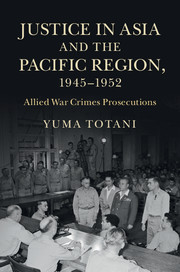Introduction
Published online by Cambridge University Press: 05 February 2015
Summary
“What kind of justice did the Tokyo War Crimes Tribunal render, victor’s justice, or humanity’s justice?” This question was posed to several dozen legal scholars, historians, military officers, and other professionals who gathered in November 2008 at the Melbourne Law School for a three-day international conference commemorating the sixtieth anniversary of the Judgment of the Tokyo Tribunal (hereafter referred to as the “Tokyo Judgment” or “the Judgment”). The Tokyo Tribunal – or the International Military Tribunal for the Far East (IMTFE) as it was officially known – was established by the Allied Powers as the eastern counterpart of the International Military Tribunal at Nuremberg. Vilified as victor’s justice by its critics in Japan, or otherwise overshadowed by Nuremberg and largely forgotten by the rest of the world, the trial held before IMTFE (referred to as the “Tokyo Trial” hereafter) came to attain a new level of significance in the 1990s when the member states of the United Nations resuscitated the long-defunct international criminal justice system in order to have it play a central role in combating genocide, war crimes, crimes against humanity, and other international offenses occurring in the world today. Conference participants, this author included, ruminated over the striking parallel between past and present international criminal trials while also trying to find an answer to the foregoing question. It became increasingly clear, however, that even though a great deal of research has been done to date, our knowledge of the Tokyo Trial is still limited to reach a definitive assessment. The conference nonetheless served as a timely forum to consider afresh the significance of the trial and determine the future directions of war crimes studies.
- Type
- Chapter
- Information
- Justice in Asia and the Pacific Region, 1945–1952Allied War Crimes Prosecutions, pp. 1 - 20Publisher: Cambridge University PressPrint publication year: 2015



